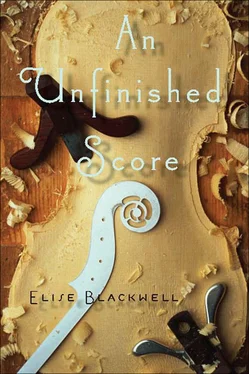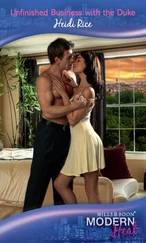She remembers to ask Ben about his work. He is collaborating on a composition with a man who is both a mathematics professor and on the adjunct music faculty, and they are arranging it for a small orchestra.
Ben nods, stabbing tubes of pasta. “We decided to cut the faux-scherzo.”
“Too obscure? The joke that isn’t?”
His hair, recently grown out from a self-inflicted haircut, flops side to side as he eats. He looks at Suzanne as though there is food on her face, more amused than annoyed but at least a little annoyed. “I argued that it pandered, and Kazuo agreed. The whole point of this staging, of using his contacts to get this performed for an audience, is to create an uncompromised piece.”
“No such thing!” says Petra.
Ben ignores her. “I want the listener to have a distilled experience, something pure.”
The listener . Suzanne pictures Richardson Auditorium one-third full: small clumps of math professors, music students, the odd mother taking a too-young child for a little culture after church, widows and widowers with the small hope of meeting one another and nothing better to do on a Sunday afternoon. Empty seats divide them.
She swipes her mouth with her napkin. “To experience the beauty of music intellectually, stripped of emotion,” she says, a refrain from one of Ben’s oft-spoken theorems.
Widows with nothing better to do . The thought recurs, means something new in its second iteration. Alex’s wife — now a widow. Her carotid arteries tense, as though there is too much blood in her body, and her pulse is all she can feel.
Adele’s eyes are fixed on Suzanne’s mouth, trying to read her words. Petra’s stare is about something else. In these faces she loves, Suzanne sees only danger. Her head feels heavy, engorged with grief beginning to swell.
Ben again shakes his head, hard, caring so obviously that his body discloses his passion. It is how they used to feel about the music — and each other — all the time, even back when they were students, when they were only posing as musicians and adults, rehearsing the people they wanted to be.
Now sarcasm sharpens his laugh. “Not stripped of emotion. Without emotional interference. No directions in the first place — no agitato , no appassionato , no doloroso —just the sublime.”
“Isn’t the sublime emotional?” Petra asks.
Suzanne closes her eyes and sees Alex. She opens them because if she thinks about Alex she will break like a glass shattered by perfect high pitch. She concentrates on what is being said at the table, tries to close the distance fast opening between her and where she sits. Even her plate seems far away, Petra’s voice oddly distant. When Ben launches into his long answer, his voice comes to Suzanne as if through a tunnel.
She knows his premiere will have three reviews. The local paper will send a cheerleader who knows nothing about music and will write up something sweet with the assistance of a music dictionary, a thesaurus, and the photocopied program. A more expensively educated and stealthy presence from the Times or the Inquirer will yield a scathing piece that neglects the composition itself in a jeremiad against the off-to-sea, out-to-lunch academy and its impenetrable, navel-gazing, masturbatory self-indulgences. The reviewer will use some of these very words.
The third review will be written by one of those several professors who knock between music and mathematics departments — a friend or admirer or enemy or former lover or teacher or student of Kazuo. It will appear, months later, in a journal carried by Princeton’s Fireside Library but not by the libraries of universities with less funding and smaller collections. The review will be positive or negative or — most likely — mixed, but it will be dense and detailed, and Ben will pronounce that at least the reviewer understood what he and Kazuo were seeking, that the reviewer got it .
“You can call it Subliminal,” Suzanne says.
Though he rarely joked himself, Alex always smiled at her silly puns, and the thought of his smile constricts her throat even to air. When it releases, she hears herself gasp, though only Adele looks up as though she has heard the sound of Suzanne desperate for oxygen.
“You know it can’t be titled,” Ben says, his voice like salt, the last of his amusement evaporated.
After dinner the evening pulls long like elastic, and Suzanne is relieved to cross the stretched time, moment by quivering moment, left foot then right. She volunteers to make Adele’s school lunch while Adele and Petra withdraw to their part of the house — two bedrooms linked by a bath — for their nighttime rituals. She makes the sandwich, puts dried apple slices in a plastic bag, tucks a vitamin in a paper napkin, and stows the lunch in the refrigerator. She reminds herself, as she has promised herself she would, that Adele is not her child.
“I’m going to stay up and read a bit,” she says when Ben turns in early. The lines traversing his forehead hold hurt, or maybe she imagines this. “We’ll spend some time this weekend.” She bends her mouth in a curve that is almost a smile.
Both times that he asked, once early in the affair and once two years in, Suzanne told Alex that she made love to her husband only rarely and when unavoidable. But that was not true. Sometimes unavoidable means preventing pain in another, or loneliness in yourself. Sometimes unavoidable means doing what someone else wants because you are the kind of person who does what others want you to do. Sometimes unavoidable means only your own generalized desire, that strong human need for touch.
“This weekend.” Ben leans down, kisses her hairline.
“Don’t forget the deadline this Friday.” When he looks puzzled, she adds, “For the teaching position.”
His face closes, his jaw tightening and his eyes cooling like water becoming ice. “I thought we already decided that commuting wasn’t something I would do.”
“It sounds like you’ve already decided, anyway.”
While new to their marriage, they would argue late into the night. They did this less out of respect for the old adage against going to bed angry than out of their eagerness to engage with ideas and with each other. Now Suzanne knows the value of truncating a quarrel, if only in sleep gained, and her words are the last of their day. Tonight they do not even make eye contact again. As on many nights, they do not say good-night.
After the bathroom tap stops running and the bedroom light dims, Suzanne takes down the whiskey bottle from the high cabinet over the refrigerator. It’s the only sure bottle in the house, not because Petra has never looked up there but because she will not drink bourbon, not even when the house is otherwise dry. Suzanne pours the whiskey heavily into a tumbler of ice cubes. Only after twenty minutes, after the last cough or toss can be heard from the bedroom or from Petra’s part of the house, does she pull out Alex Elling’s last CD.
Most recent and final. His latest and his last .
She sits with these two inanimate companions — cheap plastic case and highball glass — in the big blue armchair that has traveled with her and Ben from Philadelphia to Charleston, from Charleston to St. Louis, from St. Louis to Princeton. How hard they laughed when they stood in line at the DMV, coming to terms with the fact that they would have New Jersey drivers’ licenses. “How did this happen to us?” they asked, pretending that they were still happy, that everything they had was good enough, Suzanne pretending that she wasn’t in love with someone else. “What’s next?” she said. “North Dakota? Alabama?”
A two-dimensional Alex looks out from the CD case, baton in his capable hand. As always, he looks as though he might have walked straight out of the Black Forest: dark hair going to curls only at the ends, unlikely green eyes, skin stained tan midwinter. Though he often wore a close beard, in this photo he is clean-shaven, the way Suzanne liked him best. His neck is slender, his jawline clean, and his nose so straight and strong that Suzanne can imagine him as someone who lived a long time ago. But not as someone who died a few hours ago. He stands still, prepared to conduct but not yet in motion.
Читать дальше












